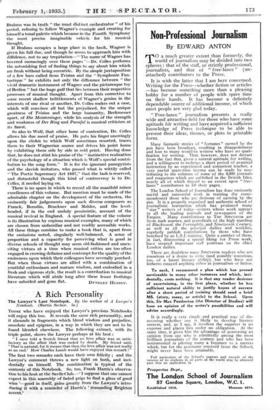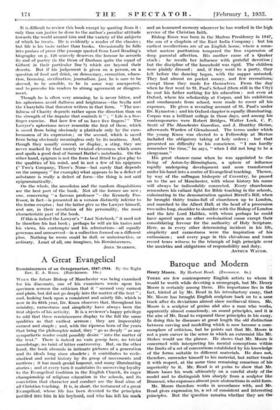'A Rich Personality The Lawyer's Last Notebqok. .By the author
of A Lawyer's Notebook. (Martin Seeker. 5s.)
THOSE who have enjoyed the Lawyer's previous Notebooks will enjoy this too. It reveals the same rich personality, and it abounds in fragments which blend wisdom and prejudice, anecdote and epigram, in a way in which they are not to be found blended elsewhere. The following extract, with its triple point, shows the Lawyer perhaps at his best :
" I once told a Scotch friend that no love affair was so satis- factory as the affair that was ended by death. My friend said, ' That is natural, for it means that then the love affair was not really at an end.' How Charles Lamb would ha't'e enjoyed this remark !"
The first two remarks each have their own felicity ; and the Lawyer's comment throws a new light on both, and inci- dentally on himself. The combination is typical of the contenti of thiS Notebook. So, too, Frank Harris's observa- tion to his host at the SavileClub.---' I suppose that one cannot
expect in this assembly of faded prigs to find a glass of good wine'-good in itself, gains greatly from the Lawyer's intro- ducing it with a reminder of Harris's resounding Brighton accent.'
It is difficult to review this book except by quoting from it : only thus can justice be done to the author's peculiar attitude towards the world around him and the variety of the subjects of which he treats. He is evidently a reader of the classics ; but life is his taste rather than books. Occasionally he falls into praises of prose (the passage quoted from Lord Reading's biography on p. 126 scarcely deserves the honour he accords it) and of poetry (is the Dean of Durham quite the equal of Gilbert in their particular line ?) which are beyond their deserts. But if his judgement is given on a person, on a question of food and drink, on democracy, cremation, educa- tion, licensing, sterilization, journalism, jazz, he is sure to be shrewd, to be sensible, to be in some way unexpected, and to provoke his readers to strong agreement or disagree- ment.
Though he is often very amusing, he is never bitter, and his aphorisms avoid dullness and brightness—the Scylla and the Charybdis that threaten writers in that form. " The use- fulness of Charity depends rather upon the direction than on the strength of the impulse that controls it " ; " Life is a five- finger exercise. But how few of us have five fingers !" The Lawyer's aphorisms never resemble the first of these, which is saved from being obviously a platitude only by the cum- brousness of its expression ; or the second, which is saved from being obviously meaningless only by its neatness. And, though they usually conceal, or display, a sting, they are never marked by that merely twisted cleverness which sours and spoils a good deal of Samuel Butler's notebooks. On the other hand, epigram is not the form best fitted to give play to the qualities of his mind, and in not a few of his epigrams (" Two's Company, Three's None—but surely that depends on the company " for example) what appears to be a defect of substance is really a defect of form—the thing is not said epigrammatically.
On the whole, the anecdotes and the random disquisitions are the best part of the book. Not all the former are new ; one, concerning " a famous professor "—the Kennedy Pro- fessor, in fact—is presented in a version distinctly inferior to the textus receplus ; but the latter give us the Lawyer himself, and are, in their revelation of his personality, the most characteristic part of the book.
If this is indeed the Lawyer's " Last Notebook," it need not be therefore his last book ; perhaps he will air his tastes and his views, his contempts -.and his admirations—all equally generous and unreserved—in a collection formed on a different plan. Nothing he wrote could be dull, or uninstructive, or ordinary. Least of all, one imagines, his Reminiscences.
JOHN SPARROW.















































 Previous page
Previous page